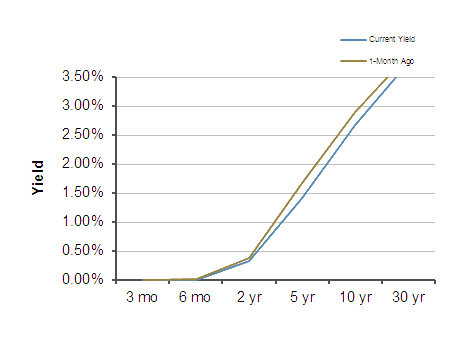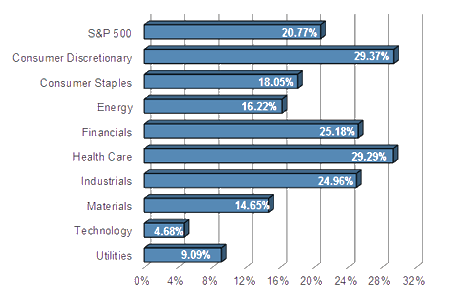 Clarksville, TN – The Federal Open Market Committee did not reduce the pace of asset purchases. In its policy statement, the FOMC noted that the improvement in economy activity and labor market conditions since it began the asset purchase program a year ago was “consistent with growing underlying strength in the broader economy,” but “the Committee decided to await more evidence that progress will be sustained before adjusting the pace of its purchases.”
Clarksville, TN – The Federal Open Market Committee did not reduce the pace of asset purchases. In its policy statement, the FOMC noted that the improvement in economy activity and labor market conditions since it began the asset purchase program a year ago was “consistent with growing underlying strength in the broader economy,” but “the Committee decided to await more evidence that progress will be sustained before adjusting the pace of its purchases.”

He expressed some concern about the rapid tightening of financial conditions, “a concern that would be exacerbated if conditions tightened further.” Bernanke indicated that the upcoming fiscal debates (on the budget and debt ceiling) may pose downside risks to the financial markets and the broader economy.
While expectations of tapering were not universal, a majority of market participants were anticipating a tapering. The decision to delay pushed bond yields lower and fueled broad gains in the stock market. However, tapering will still arrive at some point. The markets continue to put too much emphasis on tapering. Policymakers do not expect to begin raising the federal funds target rate until 2015.
Next week, there are a number of potentially market-moving data releases, but none of the reports should dramatically alter the overall economic picture. Durable goods orders and new home sales are notoriously volatile and may have the greatest chance to surprise. The market’s attention is likely to turn toward Washington. Negotiations over the budget and the debt ceiling are expected to be contentious, with some possibility of a temporary government shutdown or default. The markets are generally complacent that everything will work out, but the downside risk to the financial markets and the economy are considerable.
Indices
| Last | Last Week | YTD return % | |
| DJIA | 15636.55 | 15300.64 | 19.33% |
| NASDAQ | 3789.38 | 3715.97 | 25.50% |
| S&P 500 | 1722.34 | 1683.42 | 20.77% |
| MSCI EAFE | 1844.39 | 1790.30 | 14.99% |
| Russell 2000 | 1075.27 | 1048.48 | 26.60% |
Consumer Money Rates
| Last | 1-year ago | |
| Prime Rate | 3.25 | 3.25 |
| Fed Funds | 0.09 | 0.16 |
| 30-year mortgage | 4.50 | 3.49 |
Currencies
| Last | 1-year ago | |
| Dollars per British Pound | 1.603 | 1.622 |
| Dollars per Euro | 1.352 | 1.307 |
| Japanese Yen per Dollar | 99.440 | 78.390 |
| Canadian Dollars per Dollar | 1.025 | 0.974 |
| Mexican Peso per Dollar | 12.736 | 12.827 |
Commodities
| Last | 1-year ago | |
| Crude Oil | 106.39 | 91.98 |
| Gold | 1371.27 | 1769.68 |
Bond Rates
| Last | 1-month ago | |
| 2-year treasury | 0.33 | 0.39 |
| 10-year treasury | 2.75 | 2.89 |
| 10-year municipal (TEY) | 4.66 | 4.72 |
Treasury Yield Curve – 09/20/2013
S&P Sector Performance (YTD) – 09/20/2013
Economic Calendar
| September 24th |
— |
Case-Shiller Home Price Index (July) Consumer Confidence (September) |
| September 25th |
— |
Durable Goods Orders (August) New Home Sales (August) |
| September 26th |
— |
Jobless Claims (week ending September 21st) Real GDP (2Q13, 3rd estimate) Pending Home Sales (August) |
| September 27th |
— |
Personal Income and Spending (August) Consumer Sentiment (September) |
| September 30th |
— |
Chicago Purchasing Managers Index (September) |
| October 1st |
— |
Continuing Resolution needed ISM Manufacturing Index (September) |
| October 4th |
— |
Employment Report (September) |
| October 9th |
— |
FOMC Minutes (September 17th-18th) |
Important Disclosures
Past performance is not a guarantee of future results. There are special risks involved with global investing related to market and currency fluctuations, economic and political instability, and different financial accounting standards. The above material has been obtained from sources considered reliable, but we do not guarantee that it is accurate or complete. There is no assurance that any trends mentioned will continue in the future. While interest on municipal bonds is generally exempt from federal income tax, it may be subject to the federal alternative minimum tax, state or local taxes. In addition, certain municipal bonds (such as Build America Bonds) are issued without a federal tax exemption, which subjects the related interest income to federal income tax. Investing involves risk and investors may incur a profit or a loss.US government bonds and treasury bills are guaranteed by the US government and, if held to maturity, offer a fixed rate of return and guaranteed principal value. US government bonds are issued and guaranteed as to the timely payment of principal and interest by the federal government. Treasury bills are certificates reflecting short-term (less than one year) obligations of the US government.
Commodities trading is generally considered speculative because of the significant potential for investment loss. Markets for commodities are likely to be volatile and there may be sharp price fluctuations even during periods when prices overall are rising. Specific sector investing can be subject to different and greater risks than more diversified investments.
Tax Equiv Muni yields (TEY) assume a 35% tax rate on triple-A rated, tax-exempt insured revenue bonds.
![]() Material prepared by Raymond James for use by its financial advisors.
Material prepared by Raymond James for use by its financial advisors.
The information contained herein has been obtained from sources considered reliable, but we do not guarantee that the foregoing material is accurate or complete. Data source: Bloomberg, as of close of business September 19th, 2013.
©2013 Raymond James Financial Services, Inc. member FINRA / SIPC.




